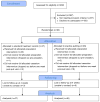A randomized clinical trial of a tailored behavioral smoking cessation preparation program
- PMID: 26827293
- PMCID: PMC4790439
- DOI: 10.1016/j.brat.2015.11.015
A randomized clinical trial of a tailored behavioral smoking cessation preparation program
Abstract
Despite considerable progress in reducing cigarette smoking prevalence and enhancing smoking cessation treatments, most smokers who attempt to quit relapse. The current randomized clinical trial evaluated the efficacy of an adjunctive behavioral smoking cessation treatment based on learning theory. Adult daily smokers were randomly assigned to standard treatment (N = 47) with nicotine patch and individual counseling or to standard treatment plus a "practice quitting" program involving seven sessions of escalating prescribed abstinence periods (N = 46) prior to a target stop smoking date. Practice quitting was designed to extinguish smoking in response to withdrawal symptoms. Retention in treatment was excellent and the treatment manipulation increased the interval between cigarettes across practice quitting sessions on average by 400%. The primary endpoint, seven-day point-prevalence abstinence four weeks post-quit, was not significantly affected by practice quitting (31.9% in the standard treatment condition, 37.0% in the practice quitting condition). Practice quitting increased latency to a first lapse among those who quit smoking for at least one day and prevented progression from a first lapse to relapse (smoking daily for a week) relative to standard treatment, however. Practice quitting is a promising adjunctive treatment in need of refinement to enhance adherence and efficacy.
Keywords: Behavioral treatment; Randomized clinical trial; Smoking cessation.
Copyright © 2015 Elsevier Ltd. All rights reserved.
Figures





References
-
- Abrams DB, Niaura R, Brown RA, Emmons KM, Goldstein MG, Monti PM. The tobacco dependence treatment handbook: A guide to best practices. New York, NY: Guilford Press; 2003.
Publication types
MeSH terms
Grants and funding
LinkOut - more resources
Full Text Sources
Other Literature Sources
Medical

